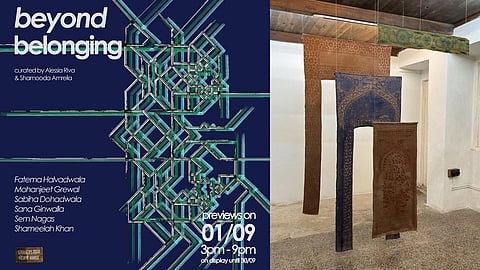
- HOMEGROWN WORLD
- #HGCREATORS
- #HGEXPLORE
- #HGVOICES
- #HGSHOP
- CAREERS
- ABOUT US
- CONTACT US

Beyond Belonging at Strangers House Gallery doesn’t just ask questions — it makes you sit with them. What is home? Is it a place? A feeling? A tether to the past, or something we construct in the present? These are not abstract musings for the six artists featured in the exhibition, but visceral realities they’ve lived. For them, home is an elusive concept, and belonging isn’t a given — it’s something they’ve had to wrestle with, redefine, and reclaim.
Curated by Alessia Riva and Shamooda Amrelia, the exhibition feels less like a collection of works and more like a gathering — a gathering of voices, experiences, and histories that have been uprooted, silenced, or erased, now converging in a space where they can speak, and be heard. There’s no neat answer to the questions posed, but that’s the point. The gallery isn’t a final destination. It’s a starting point.
Take Shameelah Khan and Sana Ginwalla’s collaborative project, Watering the Pilgrims. It begins with a simple journey: two women tracing the footsteps of their grandmothers who defied patriarchal norms to perform the Hajj without male guardians. But as the project unfolds, it becomes something much larger — a conversation between generations of women, an unearthing of stories buried by time and tradition. Through found photographs, audio recordings, and documents, Khan and Ginwalla piece together a narrative that both honors their ancestors and questions the gendered barriers that persist in religious rituals today.
Sabiha Dohadwala’s textile work, meanwhile, spins a different kind of narrative — one of memory stitched into the very fabric of existence. Her intricate weavings aren’t just art, they’re a meditation on the act of remembering. In her hands, textiles become vessels for history, pulling threads from forgotten corners of collective memory. They invite you to touch, to feel the weight of time, and to wonder: what stories have we lost, and what does it mean to recover them?
Then there’s Fatema Halvadwala, who approaches belonging through the lens of food. Her paintings are celebrations of community, depicting the kitchen as both a sanctuary and a stage. It’s where women gather, where traditions are preserved, where love is expressed through the simplest yet most profound act — feeding one another. Halvadwala’s vibrant works make it clear that food is more than sustenance, it’s a way to connect with who we are and where we come from. The kitchen, often seen as a place of domesticity, becomes a site of power, heritage, and belonging.
For Sem Nagas, belonging is about reclaiming what has been stolen — stories, identities, and histories. Her graphic art and writing explode the boundaries of what is considered acceptable, focusing on the experiences of queer and trans communities that are too often erased from mainstream narratives. Nagas’s work is unapologetically political, pushing back against the colonial and patriarchal forces that have tried to silence her and others like her. Through zines, collages, and drawings, she asserts a place for those who have been told they don’t belong.
And finally, there’s Mohanjeet Grewal’s archival photography. Her images capture a moment in history that feels both distant and eerily familiar — a young India finding its footing in the world, still scarred by Partition, yet full of promise. But Grewal doesn’t just document the political, she captures the deeply personal. Her photographs of a 1962 trip with Jacqueline Kennedy through India juxtapose moments of political power with the quiet, unspoken pain of dislocation, both personal and national. Grewal’s images remind us that history is not just a series of events — it’s a lived experience, marked by loss, hope, and the constant search for belonging.
In Beyond Belonging, each work stands on its own, but together, they form a tapestry of stories that refuse to be forgotten. These are stories of women who have defied expectation, of communities that have survived erasure, and of individuals who have found ways to belong even when home is a fleeting concept. The exhibition asks its viewers to do more than just look — to listen, to reflect, and to join the conversation. Because in the end, belonging is not about finding a place to stay. It’s about making space for yourself, and others, in a world that often tries to keep you out.
Beyond Belonging is on display till September 30, 2024 at Stranger’s House Gallery, Mumbai.
If you enjoyed reading this, here's more from Homegrown:
‘Dispersive Acts’: Attend An Exhibition Exploring Colonial Botany & Indian Resilience
Pulp Society's Paper & Play Exhibition Is Proof That Physical Art Is Far From Dead
Visit A Delhi Exhibition Using Culinary Objects To Take Us On A Journey Through Time
